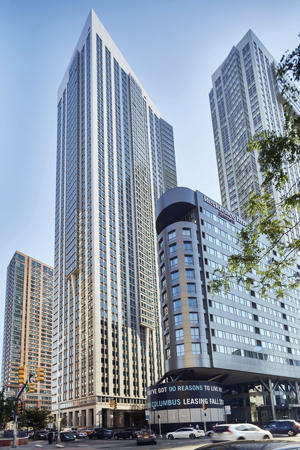Ironstate Development Company has doubled down on new projects in both New Jersey and New York City at a time when many are thinking twice about breaking new ground. The Hoboken-based firm — behind such properties as the W Hoboken hotel, the Pod Brooklyn Hotel in Williamsburg and the Standard East Village in Manhattan (with partner André Balazs), among others — has more than $1 billion in development underway.
The company, founded in 2001, has a robust pipeline of projects along Northern New Jersey’s so-called Gold Coast. Its 90 Columbus, a 51-story rental building in Jersey City with 539 units ranging from $2,850 to $4,570 per month, began leasing in September. The company has two 69-story towers at its Jersey City Urby, the first of which opened in 2017 and the second due to break ground later this year. Ironstate also has three towers with more than 1,400 rental apartment in its Liberty Harbor North complex in downtown Jersey City. In Hoboken, zoning issues have held up an Ironstate project dubbed Monarch Towers, which includes two 11-story waterfront condo buildings with 78 total units in the works. In Manhattan, Ironstate has the Lindley, a 74-unit condo in Murray Hill, and a 225-unit condo underway in Hell’s Kitchen.
Michael Barry, 51, the son of a developer, now runs Ironstate with his brother, David. The company expanded outside the tri-state area, building a boutique hotel in Jenner, California, a two-hour drive north of San Francisco, and partnering with Balazs on another hotel, the Chiltern Firehouse in London.
Although Barry declined to discuss certain subjects — such as the company’s controversial decision to allow Jersey City Urby tenants to rent their apartments for up to 30 days with Airbnb — he spoke with The Real Deal about building in an uncertain market, daredevils scaling his towers and coping with community opposition.
You’ve got a lot of projects in Jersey City and Hoboken. Is the market softening there? It’s a healthy marketplace. At 90 Columbus, we’ve leased 250 units since coming online in September — 60 units a month. At 70 Columbus, we’re staying fully occupied. We’re getting in the mid-$50s per square foot per year. For an average one-bedroom apartment with 675 square feet in a brand new high-rise with all of the amenities, we’re getting rents of $3,000 to $3,100 a month, or $37,000 a year.

90 Columbus
Many Manhattan developers are offering incentives to lure in buyers and renters. What is Ironstate doing? A typical rental project generally assumes a one-month concession on a one-year lease. For a condo project, it’s more of a case-by-case basis.
Do you have any concerns about the Manhattan condo market? I always have concerns… We’re seeing a market that’s most recently been in favor of the buyer after a number of years when it was in favor of the seller. But it’s not an upside-down market. If the economy is doing well and the market is doing well, Manhattan by its nature does well.
How risky is it to build condos given development costs and prices that you sell them for? A lot depends on location. I’m not comfortable coming online with a 500-unit high-rise that’s all condos. That’s too much risk. Over the last seven or eight years in Manhattan, an equation of 100 to 200 condo units fits well. There’s no magic number — it’s more [about] absorption. Whereas a 500-unit rental building can be absorbed within a year, a similar-sized condominium could take several years [in New Jersey].
In a 2011 interview, your brother said Ironstate’s rental occupancy rate was 90 percent. Has that changed? We’re at 95, 96 percent now. We generally have a three or four percent vacancy rate, and I think that’s healthy. It makes me uncomfortable to have a 100 percent occupancy rate.
What is the division of labor with your brother? It’s about geography — or which one of us was more instrumental in going after a particular project. Dave has tended to focus on new development opportunities, and I focus on the management of our assets. More recently, Dave has spent the majority of his time on the Urby brand. So now it’s sort of Urby versus non-Urby.
Your Urby complexes in Jersey City, Harrison and Staten Island — with another slated for Stamford — are focused on lifestyle and include amenities such as urban farms, communal kitchens and cooking classes. How do you pitch it to lenders? Lifestyle and an enjoyable home are more than just bricks and mortar. Cultural amenities enhance the living experience and therefore the value of the development.
Renowned climber Alex Honnold attempted to scale the exterior of the Jersey City Urby without a harness in September. Was that publicity good for Urby? It was a human interest story about Alex, with Urby as the canvas. It speaks to the excitement and energy of the brand. It wasn’t an Urby-directed device.
You got a $100 million inventory loan for the Murray Hill project and an $82.9 million finance package for a condo development in Long Island City. Do they help Ironstate buy more time to hit its financial targets and projected sellouts? Inventory loans, following completion of construction, allow us to reduce the interest expense, as the risk of construction is no longer present. In many instances, the interest rate on the inventory loans is half the rate of the blended construction loan.
Hoboken’s Monarch Towers was part of a five-year land use battle that recently ended when a New Jersey appellate court declined to rehear the case. Did that hurt development in the city? The litigation was a perfect example of bad government. The courts were unanimous in upholding property rights. We had an anti-development mentality from the previous [mayoral] administration, so there’s not a tremendous amount of new development coming online. The market is strong and solid — there are just not as many opportunities.
—The interview has been edited and condensed for clarity.
